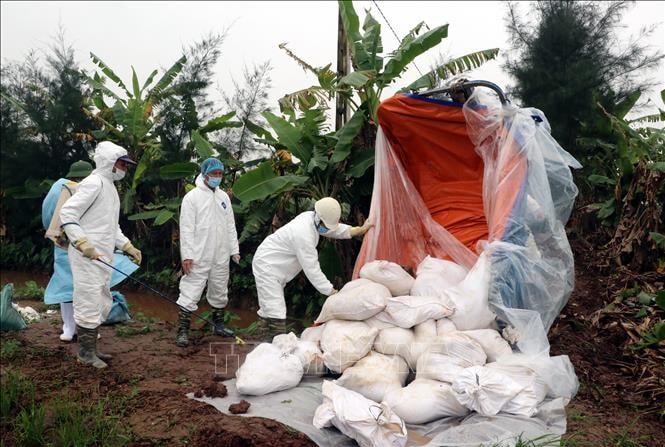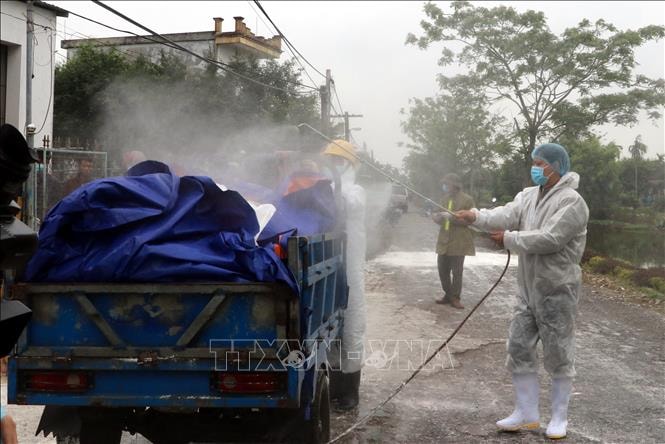Nam Dinh is the 13th province in the country to detect African swine fever.
The Department of Agriculture and Rural Development, the Department of Animal Husbandry and Veterinary Medicine of Nam Dinh province has just coordinated with professional agencies of Truc Ninh district to implement solutions to suppress African swine fever and prevent the spread of the disease after detecting an outbreak in Truc Thang commune, Truc Ninh district.
To respond to African swine fever, Chairman of Nam Dinh Provincial People's Committee Pham Dinh Nghi decided to establish a provincial interdisciplinary mobile animal quarantine team and four interdisciplinary animal quarantine checkpoints located at National Highway 10 (Nam Dinh city); My Loc toll station - National Highway 21B (My Loc district); the area near the foot of Non Nuoc bridge - National Highway 10 (Y Yen district) and Sa Cao ferry (Xuan Truong district).
The Chairman of Nam Dinh Provincial People's Committee also issued an action plan to respond urgently to African swine fever in the area.
 |
Nam Dinh province authorities transported sick pigs for destruction. |
Up to now, Truc Thang commune has established 3 quarantine checkpoints, assigned forces to be on duty 24/7 to perform tasks according to regulations; sprinkle lime powder, spray disinfectant in the epidemic area and surrounding areas.
In order to help people understand correctly and fully, the commune has regularly updated the epidemic situation and measures to prevent and control African swine fever on the loudspeaker system to the hamlets so that people can proactively prevent and control the epidemic.
At the quarantine checkpoints in Truc Thang commune, there are always functional forces on duty, spraying disinfectants and sterilizing. On the main roads of the commune, the road system leading to residential areas near the epidemic area has been sprinkled with lime powder by authorities and people, and cleaned to prevent the risk of spreading the disease.
Directly directing and handling the outbreak, Ms. Hoang Thi To Nga, Deputy Director of the Department of Agriculture and Rural Development of Nam Dinh province, requested Truc Thang commune, Truc Ninh district and local professional agencies to focus on containing the outbreak, not allowing it to spread to other areas. The authorities must strictly comply with the regulations on disease prevention and control, absolutely not allowing the transportation of pigs and pork products in and out of the epidemic area. Livestock households near the outbreak must temporarily stop slaughtering pigs.
 |
Authorities sprayed and disinfected vehicles entering and exiting Truc Thang commune, Truc Ninh district. |
Ms. Hoang Thi To Nga recommends that livestock households need to proactively implement disease prevention and control measures; apply safe livestock farming methods and measures. Currently, the State has mechanisms and policies to support pigs infected with African swine fever, so when detecting pigs with unusual symptoms, sick or dead due to this disease, households must immediately report to specialized agencies for disposal, not consume sick or dead pigs, and not hide the disease. Cases of intentional violations will be handled according to the law.
According to the test results of the Veterinary Department of Region I on the samples sent by Nam Dinh province on March 8, 4/5 samples were positive for African swine fever virus. Thus, Nam Dinh is the 13th province in the country to have African swine fever.
Previously, Quang Ninh province also discovered the first outbreak of African swine fever in Yen Duc commune, Dong Trieu town. Quang Ninh province's functional forces have isolated and destroyed all infected pigs to prevent the disease from spreading.
Hoa Lu District also maintains 24/7 operation of animal quarantine checkpoints according to the Decision of the District People's Committee; directs the Animal Husbandry and Veterinary Station to coordinate with the District Department of Agriculture and Rural Development to guide the cleaning and disinfection of epidemic areas and surrounding areas; assigns specialized staff to strengthen inspection, supervision, and timely detection of epidemics; requires livestock owners not to slaughter or sell sick or dead pigs.





.jpg)
.jpg)
.jpg)
